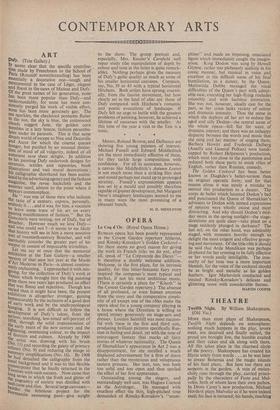OPERA
Le Coq d'Or. (Royal Opera House.)
RUSSIAN opera has been poorly represented in the Covent Garden repertory hitherto, and Rimsky-Korsakov's Golden Cockerel— for there seems no good reason for giving the work its French title: we do not, after all, speak of "Le Crepuscule des Dieux"— is therefore a doubly welcome addition. Welcome, in the first place, for its intrinsic quality, for this bitter-fantastic fairy story inspired the composer's most typical and perfect, if not his most ambitious music. (There is certainly a place for "Kitezh" in the Covent Garden repertory.) The absence of all profound, or even human emotion from the story and the comparative simpli- city of all except one of the roles make the opera ideal for a young company playing in a house where the Direction is willing to spend money generously on stage-sets and dresses. Loudon Sainthill was most success- ful with these in the first and third acts, producing brilliant pictures specifically Rus- sian in feeling and detail, yet with the note of extravagant fantasy that marks all fairy stories of whatever nationality. The Queen of Shemakhan's appearance in Act 2 was a disappointment, for she recalled a much displayed advertisement for a firm of dyers rather than the mysterious and voluptuous eastern princess. Her tent, too, was both too solid and too open and thus spoiled the effect of her first appearance.
Outstanding among the singers, and outstandingly well cast, was Hugues Cuenod as the Astrologer. He managed with excellent effect the thin, high-pitched tone demanded of Rimsky-Korsakov's " tenor- altino" and made an imposing, emaciated figure which immediately caught the imagin- ation. King Dodon was sung by Howell Glynne, rather too plebeianly realistic in his comic manner, but musical in voice and, excellent in the difficult scene of his final humiliation, as a dancer, by the Queen. Mattiwilda Dobbs managed the vocal difficulties of the Queen's part with admir- able ease, executing her high-flying roulades smoothly and with faultless intonation. She was not, however, ideally cast for the part, as her yoice lacks variety of colour and dramatic intensity. Thus the scene in which she deploys all her art to seduce the aged and silly Dodon—the central scene of the whole opera—fell flat for want, of dramatic interest; and there was an unhappy disparity between the words and music that she sang and her manner of singing them. Barbara Howitt and Frederick Dalberg (Amelfa and General Polkan) were handi- capped by Robert Helpmann's production, which went too close to the pantomime and reduced both these parts to stock roles of English, rather than Russian, comedy.
The Golden Cockerel has been better known in Diaghilev's ballet-version than its original operatic form; and for that reason alone it was surely a mistake to entrust this production to a dancer. The corps de ballet which haunted Dodon's bed and punctuated the Queen of Shemakhan's advances to Dodon with mimed expressions of opinion were wholly otiose and most distracting. And why should Dodon's mid- day siesta in the spring sunlight—the stage- directions are quite clear—take place on a stage suddenly plunged in darkness? The last act, on the other hand, was admirably staged, with monsters horrific enough to delight the most exigent and effective group- ing and movement. Of the title-role it should be said that Arda Mandikian was perhaps ill-placed for her crowing to be fully effective or her words easily intelligible. The inse- curity of her tone was a more important blemish, for the voice of the cockerel should be as bright and metallic as his golden feathers. Igor Markevitch conducted and treated Rimsky-Korsakov's delicate and glittering score with considerable finesse.
MARTIN COOPER


































 Previous page
Previous page